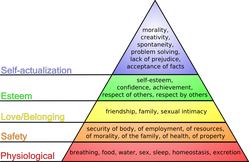 The question many people have is; “how do I know if I need therapy?” The cavalier response many give would be as follows, “when your life is falling apart,” “when you cannot manage on your own,” or “when sh** hits the fan.” Now the question becomes the following, “when do I know if my life is coming apart?” or at times seeking therapy after all has fallen apart, is too late. There is a simpler way to judge if you need therapy and you can skip the guessing game. Maslow’s Hierarchy of Needs is based on the concept that we need to have our basic physical needs met before we move on to our advanced emotional needs. Maslow explains that if we do not have our needs at the base of triangle, we are unable to continue up the ranks and reach our highest potential. At the base of the hierarchy we have our physiological needs such as sex, food, and sleep. Notice that sex is at the core of the hierarchy! Moving up to the next rank we have safety such as security of employment, resources, family and physical safety. If we have an unmet or unfulfilled need in the first 2 ranks, the need for therapy is dire. Continuing up, we have love and belonging such as friendship, family, and sexual intimacy. Seeking therapy to fulfill the needs of love and belonging is highly suggested and will surely enhance your life. The last 2 ranks are esteem and self-actualization. A therapist can assist you in achieving self-esteem and self-actualization but at this point therapy is no longer crucial yet highly beneficial. Look at Maslow’s Hierarchy of Needs, are all your needs being met? ________________________________________________________________________ Sara Schapiro-Halberstam, MHC-LP, CASAC is a psychotherapist in New York City where she practices individual therapy, couples counseling, and sex counseling. You can contact Sara at [email protected] and read more blog posts at www.mwr.nyc
0 Comments
 Admitting to extramarital sex is taboo. Admitting that sex outside your marriage is better, uho! even more of a no, no! The fact is sex outside the marriage is more exciting and alluring. Affairs teach us that erotic sex thrives on the illicit, newness, risky, out of the ordinary. These are characteristics that are hard to cultivate in a long-term relationship but guaranteed in an affair. What lessons can we learn from extramarital sex? How can we have the best sex and a committed relationship? Read more about infidelity in the article “When The Best Sex is Extramarital” by Dr. Lawrence Josephs. ____________________________________________________________________________________ Sara Schapiro-Halberstam, MHC-LP, CASAC is a psychotherapist in New York City where she practices individual therapy, couples counseling, and sex counseling. You can contact Sara at [email protected] Delayed ejaculation is defined in the DSM V as “marked delay or absence of ejaculation”. People often seek sex therapy in order to be able to ejaculate more frequently. This disorder can be physical, in that case a medical doctor would be involved in the treatment; or it can be emotional, in that case a mental health professional will provide the treatment.
Delayed ejaculation can also be man-made (no pun intended) which is referred to as the death grip. The death grip is when the nerve-endings of the penis become desensitized because of masturbation habits. These habits would include a very tight grip, not using a lubricant, and a very quick and rough hand motion. None of these habits mimic what a vagina and vaginal intercourse feels like. Therefore, the penis does not get stimulated enough during vaginal intercourse which in turn delays or inhibits orgasm. Additionally, when using the same masturbation technique at all times, the brain becomes wired to only recognize those behaviors. Switching techniques ensures that your brain does not become accustomed to only one form of stimulation. Read the article about Masturbation Death Grip to learn some excellent techniques on how to manage man-made delayed ejaculation.  Originally posted on the Jewishnews.com http://jewishnews.com/2015/12/23/bringing-them-together-intimacy-and-eroticism/ Marital and sex therapists often speak about the intriguing dynamics between intimacy and eroticism. Superficially, these two terms seem contradictory and conflicting. Intimacy is associated with predictability, while eroticism is its wild erratic sibling. Because eroticism and intimacy are starkly different, people often assume that a relationship cannot have both and that once a relationship reaches a certain level of intimacy, eroticism is no longer necessary. Even more so, there is a belief that if a relationship has intimacy; sexual pleasure and desire will follow. Researchers and experts on the topic such as Esther Perel and Barry McCarthy explain that this belief is false. Approaching relationships with an either or perspective will harm both eroticism and intimacy. To create a productive, intimate and sexually satisfying relationship one needs to incorporate both eroticism and intimacy. For a couple to grow and flourish within the partnership each factor should to be addressed. Eroticism is characterized by the incorporation of personal and sexual risks and doing things differently. Different can be a new location, a new position, or new lingerie; any small change from your regular routine. Eroticism thrives on mystery and unpredictability. The less routine or familiar something is the more it fires the excitement. Eroticism brings vitality and feelings of youthfulness into the relationship. Eroticism needs space, individuality, and autonomy. In a simple catch phrase definition, eroticism is about not being politically correct (McCarthy, 2015). Intimacy, on the other hand, is defined by being a close and intimate team. Intimacy is about predictability and routine. The knowing of what will happen next: “I know how my partner moves, I know what he likes, I know how she will react”. It’s a feeling of union and synchrony. Intimacy brings a sense of emotional and sexual security, stability, and attachment. Intimacy does not require space nor self-differentiation. Some say intimacy is the definition of love. Since intimacy is characterized by familiarity and predictability it would seem that intimacy should guarantee a good sex life. Yet, marital therapists and counselors are finding that a high level of intimacy often causes low levels of sexual desire. Couples share that their relationship began with intense sexual desire but waned out over time. This usually occurred when their relationship moved from infatuation and excitement toward love and intimacy. The challenge is to keep eroticism alive in an intimate relationship. This can be accomplished by introducing spontaneity into the relationship. Being spontaneous means that you divert from the regular routine. For example, if nighttime is your intimate time, perhaps you can switch it up from time to time to a different time of day. A spontaneous touch during the day, a brief kiss, handholding while driving, a shoulder massage, or a quick hug are all good ways to change the routine and introduce something different. Keep in mind that eroticism goes well with change, and can be achieved by exploring something new. Some more examples: trying out new lingerie, perhaps a new adult toy, changing the bedroom vibe with lighting some scented candles, and if you are ready to push your boundaries, try out role-playing or a shared fantasy. Who ever said games are only for children? Playing games is an effective way to awaken your eroticism. Be creative when designing your little secret games. Here are some suggestions of games you can play. The bartering game is a fun way to enhance daily chores. If you ask your partner to do a chore introduce it with “if you pick up my clothes from the cleaners, I will… (use your imagination here)”. Another way to keep the fire alive is by sending each other fun texts or check in with phone calls. Other options are to design games for date nights. For example, you can create a dice with different intimate roles on its faces. You and your partner take turns throwing the dice and then acting out the roles. Giggles and laughs is a sure way to bring play into your relationship. Once the erotic scenario has been played we now need to bring intimacy back. An effective approach is after-play; where you and your partner decide what you enjoy doing after an erotic encounter. Examples of after-play are cuddling, talking about random topics, discussing the things you enjoyed in your experience together, joking with one another, highlighting the aspects or traits that you like about each other. Now is a good time to gently speak about concerns you may have (not related to intimacy!). With oxytocin, also known as the cuddle hormone, pulsing through your veins, your partner is more likely to listen compassionately. After play is important for facilitating bonding and connection, so try not skip out on it. Traditionally, it was assumed that women enjoy intimacy and men enjoy eroticism. Today, we know that both men and women desire intimacy and eroticism. Intimacy is the big fluffy cozy blanket, eroticism is no blanket, and having both is when you stick your toes out. Intimacy and eroticism appear to be direct enemies. What intimacy wants, eroticism despises. The challenge is to introduce intimacy to eroticism – eroticism to intimacy, and to teach them to live happily ever after. __________________________________________________________________________ Sara Schapiro-Halberstam, MHC-LP, CASAC is a psychotherapist in New York City where she practices individual therapy, couples counseling, and sex counseling. You can contact Sara at [email protected] |
Authors
Archives
February 2023
Categories
All
|


 RSS Feed
RSS Feed